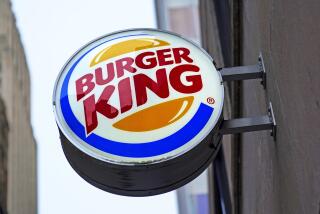Where’s the beef? Horse meat scam taints European food industries
Not since an outbreak of mad cow disease a dozen years ago have Europe’s food industries been embroiled in a crisis the likes of this past month’s discovery of horse meat masquerading as beef in prepared-food entrees sold across the continent.
The controversy over mislabeled meat in millions of frozen dinners, pastas, stews, goulashes and chilis took a turn for the worse this week when Nestle, the world’s largest food company, found horse DNA in some of its products. And testing of meals yanked from store shelves and freezers in Britain and Germany has turned up traces of phenylbutazone, commonly known as bute, a powerful equine painkiller deemed harmful to humans.
The scandal erupted last month when Irish food safety authorities found horse meat in frozen burgers labeled as pure beef. It has since spread to 13 other countries and forced authorities to recall billions of dollars’ worth of products for testing and disposal.
“Burgergate” has also highlighted the labyrinthine route that food travels from farm to table. Horse meat from a Romanian slaughterhouse was accurately labeled when it was exported to French meat processor Spanghero through a Cypriot middleman, but it acquired the beef label before being sent to a Luxembourg subsidiary that produced frozen dinners for supermarkets in Britain, Spain, Germany and Scandinavia.
In the case of Swiss-based Nestle, mislabeled Buitoni-brand pasta products have so far been found in Spain, Italy and France.
The still-unfolding scandal has spotlighted failures in the European Union food regulation network, as one of the benefits for the 27 members of the trading bloc has been unfettered access for each nation’s goods to the others’ markets. No cross-border inspections are required of imports, and even precautions undertaken after the mad cow frenzy of 2001, such as mandated documentation of each cow’s care, feeding and transport, have proved insufficient because the practice isn’t extended to horses.
After bute was discovered in horse meat slaughtered in Britain, the Federation of Veterinarians of Europe reiterated its proposal that horse owners be required to maintain detailed records of their animals’ drug treatment. Horses raised to race or pull plows and wagons are often treated with anti-inflammatory medicines like bute, which are supposed to exclude them from the food supply.
In a statement on its website, the federation warned that the lack of a centralized registry for horse veterinary records left the oversight system open to manipulation by unscrupulous traders who can obtain duplicate “passports” clean of any reference to prohibited drugs. The BBC reported this week that more than 7,000 fake medical records on horses were known to be circulating in Britain alone.
The substitution of horse meat, which typically sells for a third or less the cost of beef, was more a problem for European food processors’ reputations than a health scare until the discovery of bute in the mislabeled meat. Those perpetrating the deception could now be criminally liable.
“It’s more a case of fraud, but that’s what all these food problems start out as: someone trying to make money by pushing a product not up to standards,” said Barry Bosworth, an economist with the Brookings Institution.
Bosworth predicted that the food businesses involved in the substitution scam “will get clobbered in the short run,” which could further deepen the economic pain gripping a region suffering nearly 12% unemployment and a strangling debt crisis. But as with previous food scandals, the furor will soon die down, he said, recalling the uproar in recent years over mechanically separated meat, dubbed “pink slime,” that has abated although the stuff continues to be used broadly in fast food and mass-produced ingredients.
Some good usually comes from headline-grabbing scandals, Bosworth added. Food regulations were improved in the United States and Europe after the 2001 mad cow outbreak, when at least 80 people died from the human form of the disease, 180,000 head of cattle were found to be infected and millions of older cows were slaughtered to curb its spread.
But the short-term consequences of the horse meat ruse for Europe’s food industries are already being felt. An online poll conducted Feb. 14-15 by Consumer Intelligence of Britain found that nearly 1 in 4 of the 2,200 respondents said they were consuming less meat. And 65% said they now mistrust food labels, Reuters news agency reported.
While the deception has unsettled millions of consumers, food industry giants insist that the vast majority of their products are safe and accurately labeled. Nestle, which makes Stouffer’s, Lean Cuisine and Gerber baby foods, asserted that those brands were untouched by the horse meat scandal.
German officials on Monday announced a 10-point plan to restore consumer confidence in prepared foods after five national supermarket chains joined the parade of European purveyors found to be carrying mislabeled meat products.
“I can’t say this is the end,” Consumer Protection Minister Ilse Aigner told reporters in Berlin. “We have to count on other cases being discovered.”
ALSO:
Oscar Pistorius tells court girlfriend was killed accidentally
In Syria, more than two dozen dead in latest attack on Aleppo
Four floors, city views, garden: A retirement home fit for a pope
A foreign correspondent for 25 years, Carol J. Williams traveled to and reported from more than 80 countries in Europe, Asia, the Middle East and Latin America.
More to Read
Sign up for Essential California
The most important California stories and recommendations in your inbox every morning.
You may occasionally receive promotional content from the Los Angeles Times.











